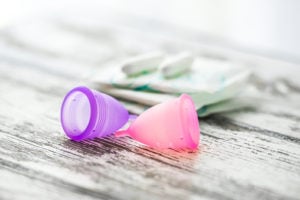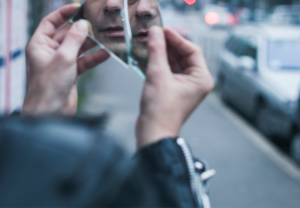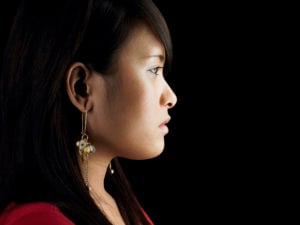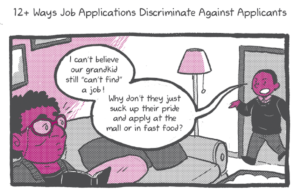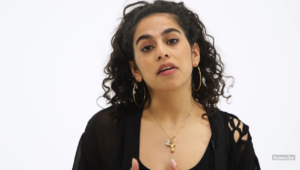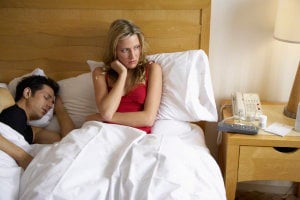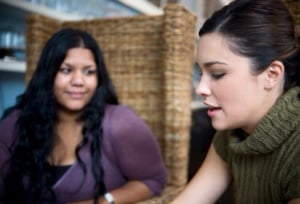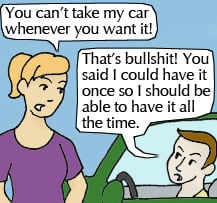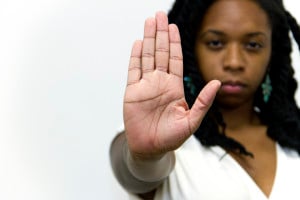As a writer who covers sexual health, I get a lot of incredibly personal e-mails about my period – or rather, how other people imagine it.
One PR person representing a menstrual relief product began an e-mail with a picture of a woman lying in a pile of blood and tears and the words: “If you’re anything like me, this is you once a month.”
“Have you ever had cramps so severe you wanted to cry but were stuck at work?” reads another.
“Let’s be honest, periods are anything but fun,” another says. “Between worrying about when it’s coming, to watching your eating habits spiral out of control, to getting super emotional, to worrying that everyone around you can also smell that funk.”
Since these people probably assume based on my name and/or Twitter photo that I identify as a woman and have a vagina, it probably never crosses their minds that I don’t really have a period.
And since they’ve presumed that periods leave everyone emotional messes, it would probably also surprise them that on the rare occasions when I do get mine, I don’t experience any symptoms other than blood coming out of my vagina.
Then, there are the period-positive brands, which are a little better. But they often have their own set of assumptions.
My period, under their philosophy, is what makes me a woman, connects me to other women and Mother Earth, and supplies my “feminine” intuition, creativity, and fluidity.
A lot of these ideas are meant to empower women. A lot of them probably do – for some. But as a non-binary person who only menstruates a few times a year for unknown reasons, I’m excluded from this magical sisterhood.
And I don’t want to be a part of it.
We can feel good about our bodies, our periods, and our a/genders without resorting to essentialist, cissexist notions about menstruation.
Here are some things we need to stop saying about periods in the name of empowerment because they disempower many of us.
1. ‘Periods Make You a Woman’
Let’s clear this up once and for all: Getting your period does not make you a woman.
Trans men get periods. Non-binary people get periods. Children get periods. And they don’t suddenly become adults when they start.
Telling kids who have just started their periods that they’re becoming women is meant to be comforting, but it’s actually disempowering – because it conveys that the thing that defines their very identity is out of their control.
When you tell a child, “You’re a woman now,” what you’re telling them is “You don’t get to say who you are.”
You’re telling them, “Society will decide who you are based on this one thing your body does, whether you like it or not.”
It’s already scary to be a child going through puberty, since your body is doing things you didn’t give it permission to do – especially if what your body does is associated with a gender you don’t identify with.
The consolation in all of this should be that your body’s changes don’t have to mean anything. Breasts don’t have to be feminine. Beards don’t have to be masculine. You can sport these characteristics however you want and make them yours, and what other people think of them is not objective reality.
Woman doesn’t have any one definition, and we shouldn’t be trying to define it for anyone else.
2. ‘Periods Bind Women Together’
In addition to claiming all people with periods are women, people sometimes claim all women have periods – and, therefore, all women have a special bond.
When deciding how much of a bond I have with someone, I ask myself questions like “How caring are they?” and “How much have we been through together?” and “Can they geek out about feminist theory with me?”
What does not cross my mind is, “Does blood come out of their vagina with the same frequency as mine?”
Sure, periods give you something to talk about. But saying that they connect everyone with them is a stretch. They’re certainly not a feasible basis for a friendship, let alone a “sisterhood,” as is commonly stated. (Plus, the observation that they “sync up” among friends, which is commonly cited to support this statement, might be false.)
The idea that periods bind women together makes womanhood into an exclusive club. Only cis women can be in it, and women like me who don’t have periods, for whatever reason, also can’t join.
Are trans women less womanly because they don’t get periods? Only if you subscribe to the false idea that your gender is based on what’s between your legs.
What about a cis woman on continuous birth control? Is she less connected to other women because she’s made the valid choice to suppress her cycle?
What about a cis woman that had a hysterectomy? Is she less connected to other women because her uterus was removed?
After you look at all the different ways people may or may not menstruate, the logic behind the imaginary sisterhood of menstruation starts to crumble.
When we say periods are something that all women have in common, we’re defining woman as “someone with a period.” And, again, it’s not our business to define anyone else’s a/gender.
3. ‘Periods Make You Feminine – Like Mother Earth’
Since periods are associated with females, people project a shit ton of “feminine” qualities onto them. They’re said to embody women’s ever-changing, earthly, emotional, and intuitive nature.
Oh, and they’re supposedly connected to the moon (another probably false claim).
I’ve seen this a lot in marketing for period trackers and other menstrual products. Our periods are deemed the source of our adaptability, our creativity, and our nurturing.
If you’re an adaptable, creative, nurturing person, and your period reminds you of that, that’s awesome.
But it’s also subjective. And the notion that it’s objective is based on harmful stereotypes.
Since ancient times, women have been deemed the more bodily gender, and their periods have been used as evidence of this. Aristotle believed that fathers provided children’s souls and menstrual blood gave babies physical form. (You can read more about this in Susan Bordo’s Unbearable Weight.)
These ideas have been used to justify sexism. To this day, while men are seen as fit to indulge in the life of the mind, women are viewed as limited by their bodies. Periods and the connected process of childbirth are commonly cited in arguments against putting women in power.
The logic behind this position is that since we’re more connected to our bodies and nature, we’re less fit for activities that involve the mind and human-made things like governments and offices. (These are all false dichotomies, by the way, but they shape how we think.)
Connecting periods with Mother Nature and other feminine concepts also invalidates people with periods who don’t identify as women – and women who don’t identify with those particular traits.
Telling someone their period makes them a woman or telling them their period makes them feminine takes away their power to decide who they are.
4. ‘Everyone Relates to the Struggles of PMS’
As the pitches that flood my inbox demonstrate, painful and distressing periods are normalized. Being comfortable in your body all month long is considered unlikely, if not impossible.
That would probably explain why people with the serious reproductive disorder endometriosis don’t seek help for four years on average.
Severe discomfort during your period is, in fact, often a sign of a disorder like endometriosis or premenstrual dysphoric disorder.
Like pain during sex, the normalization of pain during menstruation stops people from taking the measures necessary to stay comfortable.
The expectation that periods should be unbearable contributes to the stereotype that having a vagina is an experience that simply comes with pain. This contributes to misogyny and leaves people with vaginas feeling destined for unpleasant experiences throughout their lives.
The notion that all people with periods suffer from premenstrual syndrome (PMS) also gets used to invalidate us. People cite PMS as a reason women are supposedly irrational, volatile, and incapable of working.
Other times, PMS is discussed in a “wink-wink” sort of way among people with periods in the interest of sympathizing or establishing camaraderie, but it only contributes to these invalidating ideas.
A few years ago, after ending a two-year relationship, a song my ex used to play for me came on in a Starbucks. “I just started crying in a Starbucks because our song is playing,” I texted my roommate.
“Ugh, periods,” she responded. She’d seen me bring home tampons earlier.
But I wasn’t crying because I had my period. I was crying because I was heartbroken. Even if I were someone who experienced menstrual mood swings, my text made that obvious.
Instead of the support I was seeking in getting over my ex, I was offered a response with no useful implications.
I’m not saying nobody experiences emotional changes throughout their cycles. But the same way it’s invalidating to tell those people their struggles are in their heads, it’s invalidating to tell people their unrelated issues are a hormonal byproduct with no basis in reality.
5. ‘Periods Should Be Celebrated’
I’m all about finding ways to be grateful for our bodies, and there are a lot of cool things about menstruation, like its ability to reassure you that you’re not pregnant and to help you get pregnant if you want to.
But just as we shouldn’t tell people to love their bodies, even though that’s an aspiration for many of us, we shouldn’t tell people to love their periods.
Telling people how to feel detracts from their autonomy and can veer into the forced positivity we already impose on women.
Plus, telling people to celebrate their periods invalidates the distress many feel around menstruation.
Trans men and non-binary people can experience dysphoria when they’re reminded that their bodies do something stereotypically associated with women. And people with medical conditions that make their periods difficult have understandable reasons not to be happy during that time.
It’s important to know we can think about periods outside the negativity patriarchy assigns them. But once we know this, we can then choose how we conceive of our own bodies based on what feels true to our own experience.
***
A lot of feminists aren’t going to like what I’ve just written. I’ve taken away from some trendy feminist statements.
From sassy period panty ads to menstrual blood art, period positivity is all the rage right now. And we need it. But we need a better version of it.
Instead of being told what our periods mean and then being told to celebrate those things whether we relate to them or not, we should have the power to decide what our periods – and everything our bodies do – mean to us and voice however we feel about them.
And as poetic as moon cycles and synchronized bleeding are, we can experience a beautiful connection to nature and other people regardless of what are bodies do.
[do_widget id=’text-101′]
Suzannah Weiss is a Contributing Writer for Everyday Feminism. She is a New York-based writer whose work has appeared in The Washington Post, Salon, Seventeen, BuzzFeed, The Huffington Post, Bustle, and more. She holds degrees in Gender and Sexuality Studies, Modern Culture and Media, and Cognitive Neuroscience from Brown University. You can follow her on Twitter @suzannahweiss. Read her articles here.
Search our 3000+ articles!
Read our articles about:
Our online racial justice training
Used by hundreds of universities, non-profits, and businesses.
Click to learn more


